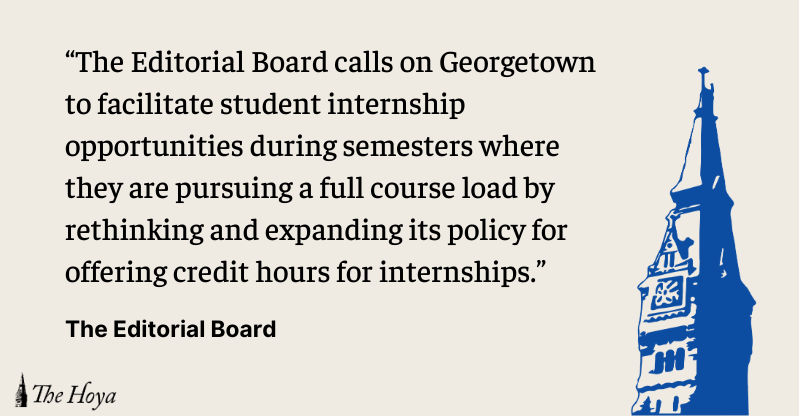A coalition of Georgetown University resident assistants (RAs) requested to unionize on March 22, submitting a letter to University President John J. DeGioia (CAS ’79, GRD ’95) that asked the university to voluntarily recognize it as a union.
Citing numerous concerns like difficult working relationships with community directors (CDs) — staff members who supervise RAs in each residence hall — and a lack of access to mental health resources, the Georgetown Resident Assistant Coalition (GRAC) serves as the group of RAs leading the unionization efforts and advocating for RAs’ needs. The majority of RAs support the unionization effort, with 85 of the 103 RAs signing GRAC’s petition to unionize and an additional 390 students signing a letter of support for GRAC as of April 4.
The university declined to recognize GRAC as a union March 27, which means the RAs will move to an April 16 election, which the National Labor Relations Board (NLRB) will oversee, to determine whether RAs will receive union representation. Should the majority of RAs vote in favor of unionization during this election, GRAC will become a formally recognized union. The university said it will respect the results of the election.
The Editorial Board urges Georgetown University to proactively address GRAC’s concerns regardless of whether GRAC unionizes. Firstly, the university must ensure RAs have access to adequate resources, especially during emergencies. Training sessions for RAs focused on crises and mental health resources should be held continuously throughout the year. Furthermore, since CDs are closely acquainted with the job of being an RA, they should be prepared to support RAs as they manage crises as opposed to simply sending them blanket resources available to all students.
In addition, the university must create anonymous reporting forms that go directly to the Office of Residential Living as well as an employee designated by the Office of Residential Living to receive grievances from an RA and relay them to CDs to ensure CDs receive and respond to feedback from RAs.
RAs start their employment in August of each year, and from the get-go, they receive insufficient training on mental and physical health resources.
This year RAs completed 10 consecutive days of training, according to an August 2023 RA training schedule that The Hoya obtained.
During this lengthy training, RAs attended only one 30-minute presentation about the Georgetown University Police Department (GUPD) and Georgetown Emergency Response Medical Service (GERMS) and one 45-minute-long program to teach RAs about Georgetown’s Counseling and Psychiatric Services (CAPS).
To have a comprehensive understanding of the resources available to support their residents and themselves, RAs need more than two short blanket sessions on GUPD, GERMS and CAPS. The university should offer multiple sessions during August training and afterward to help RAs become aware of the tools available for their residents and themselves. When crises occur, it is paramount that RAs are extremely familiar with Georgetown’s support systems and services.
It is equally important that the university ensures that a third party — separate from the RA and CD — follows up with RAs who have provided feedback.
RAs have shared stories of major communication issues with their CDs and punitive disciplinary decisions based on minor issues, according to GRAC organizer and RA Sam Lovell (CAS ’25). What complicates this further is that, currently, there are no clear and effective ways for RAs to provide feedback about their CDs.
If RAs want to give feedback to their CDs, they must fill out a semesterly evaluation form.
A university spokesperson said CDs support their RA staffers in multiple ways.
“Community Directors supervise the student Resident Assistant team and lead all community development and student formation initiatives,” the university spokesperson wrote. “They also provide mediation services to students, developmental guidance to students, and feedback to departmental leadership.”
Unfortunately, the current reality is that some RAs feel let down by their relationships with their CDs.
Lovell, who has been an RA since 2022, said when RAs attempt to provide feedback in semesterly evaluations of their CDs, this feedback often falls on deaf ears. Although Lovell said he has had no issues with his CD, he said that as a member of GRAC’s organizing committee, he has recognized that other RAs have felt unable to give CDs effective feedback.
“I’m not aware of any process where the feedback is being used to establish an expectation that behavior changes,” Lovell told The Hoya. “The impression that I think many RAs have is that the CDs see the evaluations and it’s up to them to take what they think is valid and improve upon it.”
Devan Varma (CAS ’26) said his CD, who regularly canceled staff meetings, left his job and provided his RAs with no resources for their residents.
“For me, personally, the situations I’ve dealt with, I’ve been fortunate enough that it’s been stuff I can handle,” Varma told The Hoya. “But I know for other RAs that they have not felt recognized when they’ve had those situations come about.”
The Editorial Board calls on the university to meaningfully address GRAC’s concerns, ensuring that RAs receive appropriate training on mental health and can more smoothly provide actionable feedback to CDs.
When Georgetown supports its RAs, it embodies the university value of “cura personalis,” caring for the whole person. Giving RAs better working conditions and stronger training means they are better equipped to support students — enriching every student’s working and living environment.
The Hoya’s Editorial Board is composed of six students and is chaired by the opinion editors. Editorials reflect only the beliefs of a majority of the board and are not representative of The Hoya or any individual member of the board.




















